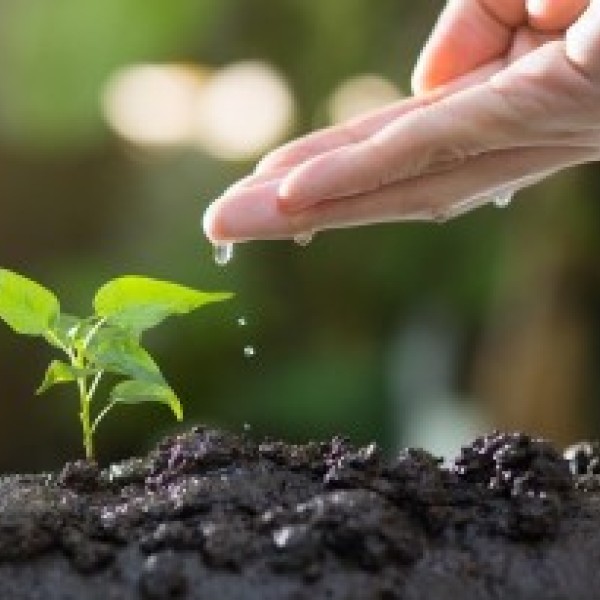Senior Resource Educator in Agriculture and Natural Resources
What inspired you to start working for Cornell Cooperative Extension?
I joined the U.S. Peace Corps in the early '90s, after grad school. Initially I planned to stay in Schuyler County, build a little cabin on the farm and never leave. But a tropical ecology class opened my eyes to all these cool trees and forests elsewhere in the world. I also had friends joining the Peace Corps. I met a recruiter on campus who was a former peace corps volunteer and we got to be friends. All these things combined to deepen my interest. A year later, I was on a plane to Argentina. During my Peace Corp years I met my wife Maria, who was finishing her English degree.

After the Peace Corps, I worked for a year as the U.S. EPA's lone forester in Washington, D.C. It was a great experience, but the 1995 government shutdowns made me reconsider. Then I worked for a forestry consulting company in Connecticut, managing 80,000 acres in southern New England for four years.
In 1998, we moved back to Argentina for a forestry project shortly after our son Ian was born. We lived near the Bolivian border, a new and exotic place for both of us. However, in 2002, with three young children and endless days of extreme heat, we decided to return to upstate New York.
Back in Watkins Glen, I decided to get a funeral director degree to help with the family business. We bought the house next to the funeral home and I worked there for a few years. I often tell people I'm a farmer, funeral director, and forester—probably the only one they'll ever meet.
Who are some of the notable influences on your career?
I went into every job thinking that was going to be the rest of my life, and every job I've ever had has taught me important things.
When I started at CCE I had the immediate good fortune of working with some of the best people out there--not just within our system, but anywhere in extension. People like Peter Smallidge. There are so many names I could name, but just within the Department of Natural Resources, every person in there is a rock star. I found that it was easy to approach these people and even easier to start collaborating with them.

How do you maintain your work life balance?
I try to keep a clear boundary between being on the clock for extension work and being “Farmer Brett.”
I quickly learned the job was largely up to me. Initially, I hoped the phone would ring with cool opportunities but soon I was triaging important tasks daily. We all do this work because we love it. It feels good to wake up knowing you're making a difference, even if it gets stressful juggling so many tasks. The gratitude and appreciation from the people we help, whether it's through education, connecting with them, or solving problems on their farms or in their forests, makes it all worthwhile.
What do you do when you aren’t working?
I love grilling meat in the Argentine asado style. I have a big portable grill. We have big get togethers with friends with lots of wine and lots of grilled meat.
I think my biggest hobby has always been my kids. They were amazing—super kids and super athletes. They were state champions and participated in a lot of sporting events. It wasn't all about sports, though. My youngest graduated from West Point two years ago, and my middle child, Clara, is a lieutenant in the Air Force. My oldest, Ian, lives nearby in Waverly with his two sons, my grandsons. Joe is in Germany, and Clara is in Florida.
We've always had a great time doing things together as a family, even though they're now in different stages of their lives. We no longer go to peewee sports tournaments or high school events, but I still cherish the moments we share. I've always strived to teach my children the importance of balance in life, ensuring that work doesn't overwhelm them.

Brett and Maria Chedzoy started raising cattle on Angus Glen Farms in 2003, after moving from Argentina where the couple had met and married while Brett was in the Peace Corps in the early 1990s.

“What we do today as farmers is really thinking about what we want to leave for the next people that are going to be farming this land, and we’ve been slowly and steadily building something that can be in our family for many years to come,” Chedzoy said.

The purposeful and managed grazing of livestock in the woods, known as silvopasturing, differs from woodlot grazing of the past in that the frequency and intensity of the grazing is controlled to achieve the desired objectives.
What impact do you hope your work will have?
Extension is very much sharing knowledge--not just transferring knowledge from the ivory tower out into the real world. I think it's much more of a collaborative sharing process in most cases. We love doing events that support peer to peer learning and knowledge development. Combined with our solid research-based work, these collaborative interactions are key to building relationships. And there is no shortcut to building relationships with people. It takes time and intention.
What I have found to be some of the easiest, fun, and most impactful events have been things like farm tours and woods walks. People are coming because they want to kick the tires on somebody else's farm, see what's going on and learn what they've done. But they're also coming for the social interactions. I've learned over the years that anytime you organize an event, you have to build in lots of time for that interaction.
I have been fortunate in my work with Peter Smallidge over the years and especially recently with some of the projects at Cornell’s Arnot Teaching and Research Forest. When we both (eventually) retire, we will know that we made a difference out there.
One standout project is the slash walls, a game changer in forestry, now adopted in at least 10 states, covering thousands of acres. We've never seen such widespread adoption before. At Arnot, we have 600 acres of slash walls with hundreds of thousands of data points over nine growing seasons. When we show people the areas inside and outside the slash walls, they see the impact immediately. It's a real "light bulb" moment for them.
Keep Exploring

News
Researchers discovered electron transfer in electroactive bacteria is mediated by CymA proteins’ ability to synchronize and form a biomolecular condensate in the cell’s inner membrane.
- Biological and Environmental Engineering

News
New York Attorney General Letitia James has directed $1.1 million to support the new Cornell College of Agriculture and Life Sciences New York Soil Health Climate Smart Agriculture Fund, aimed at working with farmers to promote healthy soils.
- School of Integrative Plant Science
- Soil

We openly share valuable knowledge.
Sign up for more insights, discoveries and solutions.


